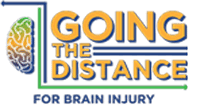2019 GTD Honoree Steve Zink
Steve Zink is a brain injury survivor with an unusual story. Unlike many other survivors of traumatic brain injury (TBI), Steve never realized the severity of his injury at the time of impact.
Steve is the Regional Safety Manager for Dairy Farmers of America with a Bachelor’s and Master’s degree in Safety and Health. During a business trip in August 2014, Steve was simply getting into his rental car on a windy day. Heavy winds blew the car door swiftly against his head. At initial impact, Steve thought, “Ouch! That’ll leave a mark!” The hit also caused Steve to lose footing and buckle his knee. After the incident, Steve saw a doctor to examine his hurt knee, but both he and his doctor ignored his head injury.
Over the following 5-6 weeks after the accident, Steve’s co-workers began to notice changes in Steve’s behavior. He experienced forgetfulness, slurred speech and trouble staying awake during the day. Steve’s coworkers began speculating reasons for his strange demeanor and considered a number of causes- including lack of sleep, exhaustion from the job and even drug/alcohol abuse. At his worst moment, several weeks after the injury, Steve could not stand up when attempting to get out of his chair at work. His colleagues were concerned and offered to drive Steve home. However, Steve insisted on driving himself. Steve then spent two hours driving around aimlessly before he reached home that day. The entire drive home was a blur to him. Then the following morning, Steve fell to the floor while trying to step out of bed.
At this point, Steve’s wife realized the gravity of the situation and called 9-1-1. Ambulance drivers raced Steve to Overland Park Regional Hospital. A CAT scan was performed on Steve and revealed a bleed in his brain. The bleed was caused weeks before by the car door slamming against his head. The situation was very serious, and Steve was rushed into surgery to relieve pressure on his brain.
After brain surgery in September 2014, Steve was put in a medically-induced coma for 10 days and monitored closely in the Intensive Care Unit (ICU). Upon waking from his coma, Steve was moved from the ICU to Trauma Recovery for seven days. Steve was stunned to learn the full extent of his surgery. Half of his head was completely shaved with a massive scar, from the incision, running across his scalp. In the initial days after surgery, Steve had to relearn simple tasks such as swallowing, talking, walking and using the bathroom.
Then Steve was transferred to Mid America Rehab Hospital and stayed there for approximately one week. He worked daily with an Occupational Therapist and Physical Therapist on a variety of skills including fine motor, task completion and walking distances to build endurance. Steve recalls feeling anxious and determined during his stay in rehab. At one time, he got himself in trouble with the staff for “sneaking out” of his bed and wandering the halls in his wheel chair.
Steve’s strong work ethic and positive attitude played a big role in his accelerated recovery. Steve returned to work in January 2015, only four months after his brain surgery. Although Steve’s recovery was faster than many survivors of TBI, Steve and his family were deeply affected by the experience and his life was forever changed. For this reason, Steve feels lucky to be alive and has a calling to help others. So Steve reached out to the Brain Injury Association of Kansas and Greater KC (BIAKS) in January of 2015. He was inspired to get involved with the BIAKS after seeing his wife’s difficulties throughout his own injury and recovery process. Steve understands that a TBI doesn’t only affect the survivor but also the survivor’s family. Steve’s goal in getting involved was to serve as a positive force for other survivors and family members.
His first contribution to the BIAKS was speaking at the Annual Professional Conference in March of 2015. Then Steve founded a support group for TBI survivors and became the group’s facilitator. Steve has a unique vision for the support group—focusing on all positive thoughts and discussions. He discourages whining or wallowing, which is a common “trap” for brain injury survivors. During the group’s monthly meetings, members engage in productive discussions as well as activities such as adult coloring books, ice breaker games, exchanging tips and advice and sharing memories.
Today, Steve Zink is 95% back to normal function. He is doing well in life and remains closely involved with the BIAKS. His mission to help and inspire other TBI survivors remains a top priority. The following quote, written by Arthur Ashe, has become his favorite motto and way of life: Start where you are. Use what you have. Do what you can.
ABOUT BIAKS
A NONPROFIT
Brain Injury Association of Kansas and Greater Kansas City (BIAKS) is a 501(c)(3) nonprofit organization, whose mission is to improve the quality of life for those affected by brain injury.
ABOUT THE
MEMORIAL DAY RUN
The first Memorial Day run was held in 1988 honoring Amy Thompson, a young woman whose courage, forgiveness and will to live gave hope to all affected by brain injury.
OUR SPONSORS
BECOME A SPONSOR
Promote your business or organization and support those affected by a brain injury. Contact amccarter@bia-ks.org
or click the link below.


